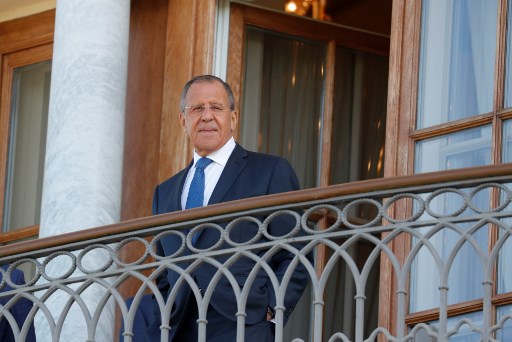

Russia said Friday the Netherlands had provided no evidence that Moscow was directly behind the 2014 shooting down of flight MH17 over war-torn east Ukraine, accusing the Dutch of promoting their own agenda.
“Dutch Foreign Minister Stef Blok called me today,” Foreign Minister Sergei Lavrov told reporters in Saint Petersburg.
“They have practically no doubt that the BUK missile came from Russia. I asked him about facts proving these claims. He did not give me any facts saying they want Russia to help establish them based on unfounded suspicions,” said Lavrov.
-Dutch “political agenda”-
He accused the Dutch of using the tragedy that claimed the lives of 298 people aboard the Malaysian plane to “achieve their own political goals”.
“If our partners have decided to speculate on this case, when it comes to the most serious human tragedy, the death of hundreds of people, to achieve their political goals, I leave it on their conscience,” Lavrov said.
Russian president’s spokesman Dmitry Peskov, also rejected claims by the Dutch and the Australian investigators, saying Moscow neither accepts nor trusts the results of an international investigation into the MH17 crash as it was not allowed to take part in it.
“Of course, without being able to be a full participant, Russia does not know to what extent the results of this work can be trusted,” he said as quoted by a Russsia Times report.
Peskov echoed the position of the Russian president Vladimir Putin who earlier said that, although Ukraine was included in the probe, Russia was barred from participating in establishing the truth.
When asked if he can confirm that Russia vehemently denies any involvement in the MH17 downing, Peskov replied “absolutely.”
On Thursday, international investigators said for the first time that the Russian-made BUK missile which smashed into the Boeing 777 in mid-air on July 17, 2014 came from a Russian military brigade in Kursk located more than 500 kilometers (300 miles) south of Moscow.
The Dutch government said Friday Russia was directly “responsible” for the downing of the plane, a move which may trigger legal action.
Lavrov compared the claim to the case of former double agent Sergei Skripal who was poisoned with a potent nerve agent along with his daughter Yulia in Britain in March.
London has determined it “highly likely” that Russia was responsible for the attack using a nerve agent developed in the USSR.
Moscow has furiously denied the charges, challenging Britain to provide evidence and mocking the phrase “highly likely”.
“This resembles the so-called Skripal case when they said ‘highly likely that’s the Russians’ but Scotland Yard immediately reported that the investigation is continuing. And it has not been completed yet,” Lavrov said.
“There is a feeling of deja vu,” he said.
“We are still ready to cooperate,” he added, saying that information that Russia has supplied should not be ignored or used selectively.
-Russia not part of probe team-
Russian President Vladimir Putin late Thursday repeated calls that Moscow should be included in the investigation team.
Russia has repeatedly said no such weapon ever crossed the Russian-Ukrainian border.
The allegation that the missile belonged to the Russian military had earlier been debunked by the Buk manufacturer, Almaz-Antey, said a report by Russia Times.
“Its real-time experiment showed that the projectile which hit MH17 (Boeing 777) was from an earlier generation and is no longer in service with the Russian military. It was found that the plane was likely shot down using an old 9M38 missile, not the newer type 9M38M1 with distinct butterfly-shaped metal fragments, which were allegedly recovered by the Dutch Safety Board,” the report said.
“Moreover, Almaz-Antey’s findings, which analyzed the angle from which the projectiles entered the cockpit of the ill-fated flight, showed that the most probable location of the launch site could be only on Kiev-controlled territory. Untampered Russian radar data provided by Moscow led to similar conclusions,” it added.
(Agence France-Presse with a report from Russia Times)
